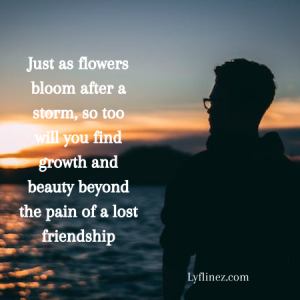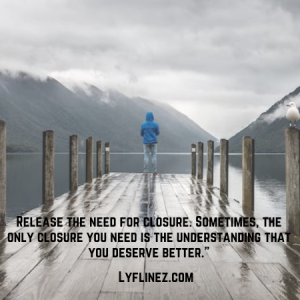Friendship is a beautiful and essential part of our lives, providing support, laughter, and shared experiences. However, just like any other relationship, friendships can face challenges, and sometimes, they come to an end and then you wonder sadly how to stop obsessing over a lost friendship.
Dealing with a friendship breakup can be emotionally taxing, leading to obsessive thoughts and a struggle to move on. Friendships hold a significant place in our lives, shaping our experiences and providing a sense of companionship.
However, when a friendship ends, it can be challenging to move on, leading to obsessive thoughts that impact our mental well-being.
Friendship breakups, much like romantic breakups, can be painful, leaving us questioning what went wrong. It’s essential to reflect on the dynamics of the friendship and identify any underlying issues that may have contributed to its demise.
Sometimes, friendships drift apart as interests change, or life takes different paths. Other times, conflicts and misunderstandings can strain the relationship. Understanding the root cause is the first step in the healing process.

What Is Meant By Obsessing Over a Lost Friendship
Obsessing over a lost friendship is like not being able to let it go. It’s when you can’t stop thinking about the good times you had with that friend, and you keep replaying memories in your head.
It’s like your mind is stuck in a loop, and you can’t move on being super fixated on a friendship that’s not there anymore, and it can mess with your emotions big time.
Your mind playing a movie reel of all the good times you had with that friend, and it’s on repeat.
You might wonder what went wrong, why the friendship ended, and if there’s any way to fix it. It’s this intense focus on the past, and it can be hard to break out of that cycle.
Sometimes, it’s not just remembering the good stuff. You might also be stuck thinking about what you could have done differently or beating yourself up about the friendship falling apart.
It’s like your emotions are tangled up in this friend-shaped knot, and it’s tough to untangle.
Obsessing over a lost friendship can mess with your mood and make it harder to enjoy the present. It’s like your mind is living in the past, and it can be a real challenge to shift your focus back to what’s happening now.
The key is finding a way to untangle those emotions, maybe by talking to someone about it or finding new activities and friends to help create new, positive experiences.
Understanding Friendship Breakup
Understanding a friendship breakup can be a challenging process, requiring a closer look at what might have gone wrong and the emotional toll of losing a good friend.
Friendships can deteriorate due to various reasons. Communication breakdown is common, with unspoken expectations and misunderstandings causing gradual distance.
Changing dynamics, evolving priorities and conflicting interests can strain connections. Unresolved conflicts and a lack of effort to understand each other can lead to resentment.
Personal growth may also impact friendships, creating mismatches in values or lifestyles. Trust issues or betrayal can fracture the foundation of a friendship. Major life transitions, such as moving or starting a new phase, can contribute to the physical or emotional distance.
The Pain Of Losing A Good Friend
Losing a good friend is emotionally impactful. It feels like a significant piece of your support system is suddenly gone, leaving an emotional void.
The process involves grieving the friendship, accepting the absence, and navigating the accompanying emotions.
Feeling alone is common, especially if the friend was a confidant with whom you shared significant life experiences.
The experience may trigger questioning of self-worth, leading to self-doubt and an internal search for flaws that may not exist.
Letting go of a friend is a complex process that involves accepting that the relationship has reached its natural conclusion.
It requires acknowledging the pain while recognizing that holding on might not be healthy.
Moving forward entails focusing on personal growth, building new connections, and allowing oneself the necessary time and space to heal.
The end goal is to understand that the pain is part of the process, and with time, one can emerge stronger and more resilient.
How To Recognize Obsessive Thoughts
Obsessive thoughts can be overwhelming and disruptive to daily life. Recognizing them involves understanding both the signs and symptoms and delving into the root causes.
A. Signs and Symptoms:
- Repetitive and Intrusive: Obsessive thoughts are persistent and often intrusive. They can replay in your mind like a broken record, making it challenging to focus on other aspects of life.
- Anxiety and Distress: These thoughts are usually accompanied by a sense of anxiety or distress. They evoke strong emotions that can range from fear to unease.
- Time-Consuming: If a significant amount of time is spent dwelling on these thoughts, to the detriment of other responsibilities or activities, it may indicate obsessiveness.
- Interference with Daily Functioning: Obsessive thoughts can interfere with daily functioning, affecting work, relationships, and overall well-being. They might lead to difficulty concentrating or completing tasks.
- Compulsive Behaviors: Sometimes, obsessive thoughts are linked to compulsive behaviors—repetitive actions or rituals performed in an attempt to alleviate the anxiety associated with the thoughts.
- Impact on Sleep: These thoughts can disrupt sleep patterns, leading to difficulties falling asleep or staying asleep. The mind may race with obsessive thoughts even during nighttime.
- Negative Thought Patterns: Obsessive thoughts often involve negative scenarios or fears. They may revolve around potential catastrophes or worst-case scenarios, fueling a cycle of worry.
- Inability to Control Thoughts: Individuals experiencing obsessive thoughts often find it challenging to control or redirect their thinking. Despite efforts to push the thoughts away, they persist.
B. Understanding the Root Causes:
- Anxiety Disorders: Obsessive thoughts are commonly associated with anxiety disorders, such as obsessive-compulsive disorder (OCD), where repetitive thoughts drive compulsive behaviors.
- Trauma and PTSD: Past traumatic experiences can lead to intrusive thoughts as a way for the mind to process and make sense of the trauma. Post-traumatic stress disorder (PTSD) often involves persistent, distressing thoughts related to the traumatic event.
- Stress and Overwhelm: High levels of stress or feeling overwhelmed by life circumstances can trigger obsessive thoughts as the mind attempts to gain control or find solutions to perceived problems.
- Neurological Factors: Imbalances in neurotransmitters, particularly serotonin, are linked to obsessive thoughts. Neurological factors can contribute to the development of obsessive-compulsive disorders.
- Genetic Predisposition: There may be a genetic predisposition to obsessive thoughts. If family members have a history of anxiety disorders or obsessive-compulsive behaviors, there may be a higher likelihood of experiencing similar thoughts.
- Lack of Coping Mechanisms: Individuals who lack effective coping mechanisms for stress and anxiety may be more prone to developing obsessive thoughts as a maladaptive way of dealing with emotional challenges.
Recognizing obsessive thoughts involves understanding the signs and symptoms while understanding the root causes provides insight into the underlying factors contributing to their presence. Seeking professional help, such as therapy or counseling, can be crucial in addressing and managing obsessive thoughts.

How To Stop Obsessing Over A Lost Friendship
Stopping the obsessive thoughts and emotions tied to a lost friendship is a gradual process that involves self-reflection, coping strategies, and a commitment to emotional well-being. Here’s a detailed guide on how to stop obsessing over a lost friendship:
Acceptance and Acknowledgment:
Begin by acknowledging the pain and accepting that the friendship has ended. Understand that it’s normal to feel hurt, but dwelling on the past won’t change the situation.
Allow Yourself to Grieve:
Losing a friend is a significant loss, and it’s essential to allow yourself to grieve. Give yourself the time and space to experience and process the range of emotions that come with it.
Reflect on the Friendship:
Reflect on the friendship without idealizing it. Consider the positive aspects but also acknowledge any negative dynamics or reasons the friendship ended. This realistic perspective can help in moving forward.
Set Boundaries:
Establish clear boundaries to prevent constant reminders of the lost friendship. This might involve limiting contact on social media or avoiding places that trigger memories.
Express Your Emotions:
Find healthy outlets to express your emotions. Talk to friends, family, or a therapist about your feelings. Journaling can also be a helpful way to process your thoughts.
Focus on Self-Care:
Prioritize self-care to nurture your physical and emotional well-being. Ensure you’re getting enough sleep, maintaining a healthy diet, and engaging in activities that bring you joy.
Explore New Interests:
Channel your energy into discovering new interests or rediscovering old hobbies. This not only occupies your mind but also helps in creating a sense of purpose and fulfillment.
Build a Support System:
Surround yourself with supportive friends and family. Having a strong support system can provide comfort and help ease the feelings of loneliness associated with the lost friendship.
Challenge Negative Thoughts:
Actively challenge negative thoughts about yourself or the friendship. Replace them with more positive and realistic perspectives. This cognitive restructuring can gradually shift your mindset.
Practice Mindfulness and Meditation:
Incorporate mindfulness and meditation into your daily routine. These practices can help you stay present, reduce anxiety, and gain better control over your thoughts.
Seek Professional Help:
If obsessive thoughts persist and significantly impact your daily life, consider seeking the assistance of a mental health professional. Therapy can provide valuable tools and strategies for managing and overcoming obsessive thoughts.
Forgiveness (for Yourself and Others):
Work towards forgiveness, both for yourself and the friend. Understand that forgiveness is more about your well-being than condoning any hurtful actions. It’s a crucial step in releasing the emotional burden.
Set New Goals:
Establish new personal or professional goals. Redirecting your focus towards the future can be empowering and create a sense of purpose beyond the lost friendship.
Celebrate Progress:
Acknowledge and celebrate small victories in your journey to overcome the obsession. Celebrating progress, no matter how minor, reinforces positive changes and builds resilience.
Remember, healing from a lost friendship is a gradual process, and everyone’s timeline is different. Be patient with yourself, and if needed, seek professional guidance to navigate through the complexities of emotions tied to the loss.

Dealing With The Emotional Fallout: The Mental Health Impact Of Friendship Breakups
Friendship breakups can take a toll on mental health, echoing the emotional impact experienced in the aftermath of romantic relationships.
The emotional distress stemming from such breakups includes a range of feelings like sadness, loneliness, and sometimes anger.
The weight of stress increases, fueled by uncertainties about the future and concerns regarding establishing new connections.
Self-esteem may take a hit as individuals question their likability, worth, or ability to maintain meaningful connections, contributing to a negative self-perception.
The loss of a close friend can create a profound sense of isolation, intensifying feelings of emptiness and sadness.
Feelings of guilt and shame may also surface, particularly if the friendship ended on a negative note or if one feels responsible for the breakup.
Sleep disturbances often accompany friendship breakups, with intrusive thoughts, emotional turmoil, and a sense of loss contributing to difficulties falling asleep or staying asleep.
Mental health struggles can impact daily functioning, leading to challenges in concentration, motivation, and interest in once-enjoyable activities.
Prolonged emotional distress from a friendship breakup may increase the risk of depression, underscoring the importance of recognizing symptoms and seeking support when needed.
Grieving the loss of a friendship is a crucial part of the healing process. Allowing oneself the time and space to experience and express the range of emotions that accompany grief is essential.
Validating these feelings without judgment is crucial, acknowledging that it’s okay to feel sadness, anger, confusion, or a mix of emotions.
Building New Connections Will Help You
Building new connections and making new friends can be a refreshing and transformative process, offering the opportunity for a fresh start and personal growth.
Seeking support from friends, family, or a mental health professional can provide comfort and aid in navigating the complex emotions tied to friendship breakups.
Practicing self-compassion involves treating oneself with kindness during this challenging time. Embracing change over time is a key aspect of this journey. In the pursuit of making new friends:
Open Yourself to New Experiences:
Embrace opportunities to engage in new activities or join clubs and social groups. This not only exposes you to different people but also provides shared interests as a foundation for potential friendships.
Initiate Conversations:
Take the initiative to start conversations with people you encounter in various settings. This can be as simple as striking up a chat with a colleague, classmate, or someone at a social event.
Be Genuine and Authentic:
Authenticity is crucial in building meaningful connections. Be yourself and share your interests, thoughts, and experiences genuinely. This openness creates a foundation for authentic relationships.
Attend Social Events:
Participate in social events or gatherings, whether they be organized by friends, colleagues, or local community groups. These environments provide opportunities to meet new people in a relaxed setting.
Join Online Communities:
Explore online platforms and communities related to your interests. Participating in discussions, forums, or virtual events can lead to meaningful connections with like-minded individuals.
Be Approachable:
Project an approachable and friendly demeanor. Smiling, making eye contact, and displaying openness can make it easier for others to initiate conversations with you.
Volunteer:
Consider volunteering for causes or organizations you are passionate about. This not only allows you to contribute to something meaningful but also introduces you to individuals who share similar values.
Attend Classes or Workshops:
Enroll in classes or workshops that align with your interests. Whether it’s a fitness class, art workshop, or educational course, these settings provide opportunities to connect with others who share your passions.
Follow-up:
If you meet someone interesting, be proactive in following up. Exchange contact information and suggest getting together for coffee, a meal, or another activity.
Be Patient and Open-Minded:
Building new connections takes time, and not every interaction will result in a deep friendship immediately. Be patient, and open-minded, and allow relationships to develop naturally.
Building new connections is a dynamic and ongoing process.
It involves a combination of proactive efforts, an open heart, and a willingness to embrace change.
As you navigate this journey, remember that each new connection brings the possibility of a unique and enriching friendship.

Make Change In Yourself Over Time
Engaging in self-care activities that promote well-being, such as exercise, meditation, or spending time in nature, can contribute to the healing process.
Setting healthy boundaries, such as limiting contact with friends on social media, may be necessary for protecting emotional well-being. In embracing change over time:
Adapt to New Circumstances:
Life is dynamic, and circumstances change. Be adaptable and open to adjusting your social approach based on changes in your environment, interests, or personal circumstances.
Learn from Past Experiences:
Reflect on past friendships and consider what worked well and what didn’t. Use these insights to inform your approach to building new connections.
Celebrate Diversity in Friendships:
Recognize that each person brings unique qualities to a friendship. Embrace diversity in your social circle, appreciating different perspectives, backgrounds, and interests.
Invest in Self-Improvement:
Personal growth contributes to positive interactions with others. Invest in self-improvement, whether through learning new skills, pursuing hobbies, or working on aspects of yourself that you want to develop.
Cultivate a Positive Mindset:
Approach the process of making new friends with a positive mindset. Focus on the potential for meaningful connections and the opportunity to enrich your social life.
Using Hobbies to Redirect Your Focus:
Engaging in hobbies and interests plays a significant role in coping with friendship breakups.
Hobbies can serve as a constructive outlet for emotions, providing a way to redirect your focus and energy.
Whether it’s a creative pursuit, a physical activity, or a hobby you’ve always wanted to explore, immersing yourself in something you enjoy can be therapeutic.
Hobbies not only offer a distraction from negative thoughts but also contribute to personal growth and the development of new skills.
They create a positive and fulfilling space where you can channel your emotions and rediscover a sense of purpose
Passionate Distraction:
Immerse yourself in hobbies that ignite passion and interest. Whether it’s painting, writing, playing an instrument, or gardening, these activities can redirect your focus and provide a sense of accomplishment.
Therapeutic Expression:
Hobbies offer a creative and therapeutic outlet for expressing emotions. Artistic pursuits, in particular, can serve as a medium for processing and communicating feelings that may be challenging to express verbally.
Building a Positive Routine:
Establishing a routine around your hobbies creates a positive structure in your life. Consistency in engaging with activities you love contributes to a healthier mindset and a more balanced emotional state.
Joining New Activities to Meet New People:
Expanding Social Circles:
Joining new activities related to your interests introduces you to like-minded individuals. Shared hobbies provide a natural context for meeting new people, fostering connections beyond the confines of the past friendship.
Group Settings:
Participate in group activities or classes where collaboration is encouraged. Working together on a shared project or learning something new can create a supportive and friendly atmosphere conducive to forming new friendships.
Community Engagement:
Engage in community events or volunteer work related to your passions. Not only does this expand your social network, but it also offers the satisfaction of contributing to a cause you believe in.
Seeking Support Through Therapy:
Hobbies and interests serve as powerful tools for coping with friendship breakups by providing a positive outlet for emotions and opportunities to meet new people.
If emotional distress persists, seeking support through therapy is a proactive step toward understanding and working through complex feelings, developing coping strategies, and building resilience for the future.
The emotional fallout significantly impacts mental health, and considering professional help through therapy can provide valuable tools for coping and navigating the challenges of friendship breakups. Healing is a unique journey, and prioritizing mental health is a crucial step toward recovery.
When to Consider Therapy After a Friendship Breakup:
Persistent Emotional Distress:
If you find yourself experiencing persistent emotional distress, such as intense sadness, anxiety, or feelings of worthlessness, it may be an indicator that professional support is needed.
Impact on Daily Functioning:
If the emotional fallout from the friendship breakup significantly impacts your daily functioning, including work, relationships, and self-care, therapy can provide tools to cope and regain stability.
Isolation and Loneliness:
If feelings of isolation and loneliness persist, a therapist can offer guidance on building new connections and strategies for navigating the challenges of loneliness.
Difficulty Moving Forward:
If you find it challenging to move forward, let go of obsessive thoughts, or adapt to the changes, therapy can provide a safe space to explore these difficulties and develop coping mechanisms.
Working Through Your Feelings with Professional Help:
Exploring Complex Emotions:
Therapy provides a supportive environment to explore complex emotions tied to the friendship breakup. A therapist can help you make sense of your feelings and navigate the grieving process.
Developing Coping Strategies:
A therapist can work with you to develop effective coping strategies. This may involve cognitive-behavioral techniques, mindfulness practices, and tools for managing intrusive thoughts.
Setting Personal Goals:
Therapy can assist in setting and achieving personal goals, whether they involve building new connections, enhancing self-esteem, or navigating life changes. A therapist guides the creation of a path toward positive change.
Gaining a Fresh Perspective:
Professional help offers a fresh perspective on the situation. Therapists provide insights and support that can lead to a better understanding of oneself and the dynamics of past relationships.
Building Resilience:
Through therapy, individuals can build resilience and develop emotional skills that contribute to overall well-being. This resilience is crucial for navigating future challenges and maintaining healthy relationships.
Acceptance and Letting Go
Acceptance is a crucial step in moving on from a friendship that has ended. It involves acknowledging the reality of the situation and letting go of emotional attachments.
Acceptance doesn’t mean suppressing emotions but rather facing them to facilitate healing. By embracing acceptance, you create the groundwork for personal growth and the possibility of new experiences.
Acknowledge the reality that the friendship has ended. Allow yourself to feel the range of emotions that come with acceptance, whether it’s sadness, disappointment, or relief.
Let go of any resentment or lingering negative feelings. Use the acceptance of the friendship’s end as an opportunity for personal growth and reflection on lessons learned.
Create emotional distance to allow space for healing. Reconnect with aspects of yourself that may have been overshadowed by the friendship.
Set new personal or professional goals to redirect your focus toward the future. Seek support from friends, family, or a therapist to navigate the emotional challenges of moving on.
Navigating mutual friendships after a friend breakup can be challenging but manageable with grace and maturity. Avoid taking sides and encourage mutual friends to maintain relationships with both parties.
Communicate openly about your feelings with mutual acquaintances, and set boundaries if needed to protect your emotional well-being.
Focus on building individual connections within your social circle, spending time one-on-one to strengthen relationships without the shadow of the past.
Acceptance and letting go are pivotal in moving on from a friendship that has ended.
Navigating mutual friendships requires maturity and open communication while building new connections within your social circle involves being open to new relationships and engaging in group activities.
Embracing these principles paves the way for personal growth, resilience, and the potential for fulfilling new connections.
Further Readings
- Surefire Signs She Wants To Be With You Forever In Life
- How To Make Your Boyfriend Happy – Romantic & Creative Ways
- Things Toxic Partners Say In A Fight & How To Break Free From Toxicity
- Signs She Cheated And Feels Guilty For Hurting You
Conclusion
How to stop obsessing over a lost friendship: Overcoming the obsession with a lost friendship involves accepting the reality of the situation, redirecting focus through new activities, and actively building new connections.
Seeking support, practicing self-care, and allowing time for healing are crucial elements in this personal journey.
By embracing change and prioritizing well-being, individuals can gradually let go of the past and open themselves to the possibilities of a fulfilling present and future.
Be open to building new connections within your social circle. Embrace opportunities to meet new people and foster meaningful relationships beyond the shared past.
Engage in group activities to allow for the organic development of connections without the pressure of one-on-one interactions.
Show genuine interest in the lives of those around you and attend social gatherings to expand your network.
